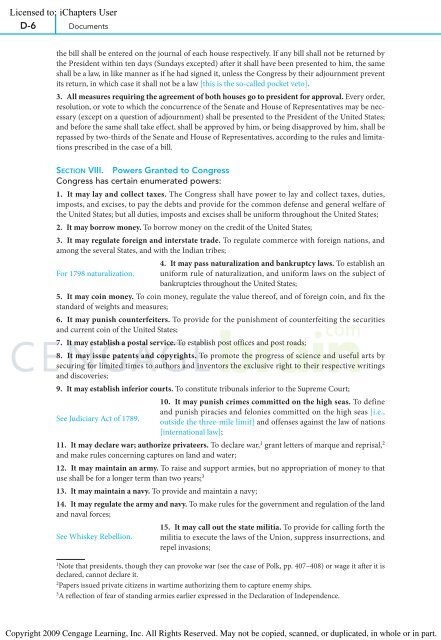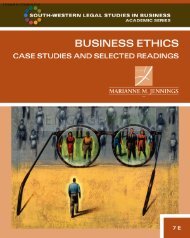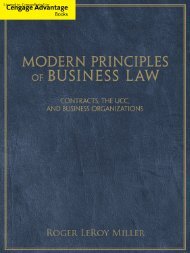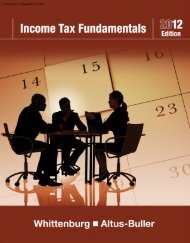03469_00_FM_pi-xxxii pp2.indd - CengageBrain
03469_00_FM_pi-xxxii pp2.indd - CengageBrain
03469_00_FM_pi-xxxii pp2.indd - CengageBrain
You also want an ePaper? Increase the reach of your titles
YUMPU automatically turns print PDFs into web optimized ePapers that Google loves.
Licensed to:<br />
D-6 Documents<br />
the bill shall be entered on the journal of each house respectively. If any bill shall not be returned by<br />
the President within ten days (Sundays excepted) after it shall have been presented to him, the same<br />
shall be a law, in like manner as if he had signed it, unless the Congress by their adjournment prevent<br />
its return, in which case it shall not be a law [this is the so-called pocket veto].<br />
3. All measures requiring the agreement of both houses go to president for approval. Every order,<br />
resolution, or vote to which the concurrence of the Senate and House of Representatives may be necessary<br />
(except on a question of adjournment) shall be presented to the President of the United States;<br />
and before the same shall take effect, shall be approved by him, or being disapproved by him, shall be<br />
repassed by two-thirds of the Senate and House of Representatives, according to the rules and limitations<br />
prescribed in the case of a bill.<br />
SECTION VIII. Powers Granted to Congress<br />
Congress has certain enumerated powers:<br />
1. It may lay and collect taxes. The Congress shall have power to lay and collect taxes, duties,<br />
imposts, and excises, to pay the debts and provide for the common defense and general welfare of<br />
the United States; but all duties, imposts and excises shall be uniform throughout the United States;<br />
2. It may borrow money. To borrow money on the credit of the United States;<br />
3. It may regulate foreign and interstate trade. To regulate commerce with foreign nations, and<br />
among the several States, and with the Indian tribes;<br />
4. It may pass naturalization and bankruptcy laws. To establish an<br />
uniform rule of naturalization, and uniform laws on the subject of<br />
bankruptcies throughout the United States;<br />
5. It may coin money. To coin money, regulate the value thereof, and of foreign coin, and fix the<br />
standard of weights and measures;<br />
6. It may punish counterfeiters. To provide for the punishment of counterfeiting the securities<br />
and current coin of the United States;<br />
7. It may establish a postal service. To establish post offices and post roads;<br />
8. It may issue patents and copyrights. To promote the progress of science and useful arts by<br />
securing for limited times to authors and inventors the exclusive right to their respective writings<br />
and discoveries;<br />
9. It may establish inferior courts. To constitute tribunals inferior to the Supreme Court;<br />
10. It may punish crimes committed on the high seas. To define<br />
and punish <strong>pi</strong>racies and felonies committed on the high seas [i.e.,<br />
outside the three-mile limit] and offenses against the law of nations<br />
[international law];<br />
11. It may declare war; authorize privateers. To declare war, 1 grant letters of marque and reprisal, 2<br />
and make rules concerning captures on land and water;<br />
12. It may maintain an army. To raise and support armies, but no appropriation of money to that<br />
use shall be for a longer term than two years; 3<br />
For 1798 naturalization.<br />
See Judiciary Act of 1789.<br />
13. It may maintain a navy. To provide and maintain a navy;<br />
14. It may regulate the army and navy. To make rules for the government and regulation of the land<br />
and naval forces;<br />
15. It may call out the state militia. To provide for calling forth the<br />
See Whiskey Rebellion. militia to execute the laws of the Union, suppress insurrections, and<br />
repel invasions;<br />
1 Note that presidents, though they can provoke war (see the case of Polk, pp. 407–408) or wage it aft er it is<br />
declared, cannot declare it.<br />
2 Papers issued private citizens in wartime authorizing them to capture enemy ships.<br />
3 A refl ection of fear of standing armies earlier expressed in the Declaration of Independence.<br />
Copyright 2<strong>00</strong>9 Cengage Learning, Inc. All Rights Reserved. May not be co<strong>pi</strong>ed, scanned, or duplicated, in whole or in part.










